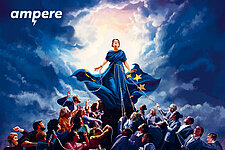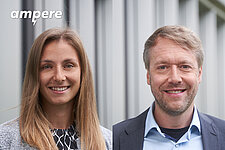The idea sounds very promising and can be summarised in a simple formula: “One in, one out”. This refers to the principle of offsetting newly introduced burdens at EU level by reducing existing burdens in the same policy area. So far, how-ever, companies in the European Union have experienced none of this – quite the opposite: “The regulatory frenzy in Europe is getting worse and worse,” states ZVEI President Dr Gunther Kegel. This is also the conclusion reached by the National Regulatory Control Council in its annual report for 2023: “Bureaucracy costs amount to some 65 billion euros per year. So there is still a considerable need for action here and great potential for relief.”
More than 50 per cent of companies’ bureaucratic costs are caused by EU and international law. What this means in practice can be seen, for example, in the regulations on sustainability reporting. Europe’s companies are expected to comply with 13 standard regulations totalling around 400 pages. Small and medium-sized companies in particular are reaching their limits in the face of such reporting and verification obligations – even if they are not supposed to be affected by a new law due to their size (more on this in the article on page 28).
All of this is taking place against a backdrop of international uncertainty, rising prices, a shortage of skilled labour and growing global competition. If the EU, as a continent poor in raw materials, wants to remain a region of prosperity and stability in the future, it must develop the creative potential of its people and companies. And that means it must finally loosen the shackles where they are unnecessary and only cause damage. Otherwise, the economic and political balance worldwide will shift more and more in favour of other groups of countries such as the BRICS states (see the infographic on page 18).
However, “less EU” cannot be the answer to the current challenges. In recent decades, the European Union has been a key driver of growth and prosperity in the member states. And it can stay that way. According to a study by the European Parliament, further integration of the community could generate an additional 2.8 trillion euros in gross national product by 2032. Conversely, Brexit shows the consequences of leaving the EU. It costs companies in the UK around 100 billion pounds a year.
So what needs to be done to get the EU back on track? From ZVEI’s point of view, there are, among others, the following three central tasks: Firstly, the EU internal market must be further developed and the regulatory burden reduced. Secondly, Europe must develop its energy infrastructures together and create a new electricity market design. And thirdly, the European standardisation system must continue to be driven by the stakeholders (more on this on page 24).
Europe can do more. We just have to let the continent get on with it. And drive it forward with pragmatic solutions.


![[Translate to Englisch:] [Translate to Englisch:]](/fileadmin/_processed_/e/d/csm_ampere_1_2024_Chefsache_Web_750x500_01_bfa9bd6792.jpg)
![[Translate to Englisch:] [Translate to Englisch:]](/fileadmin/_processed_/5/7/csm_ampere_1_2024_Zwiegespraech_Web_750x500_Teaser_47fd1761f1.jpg)

